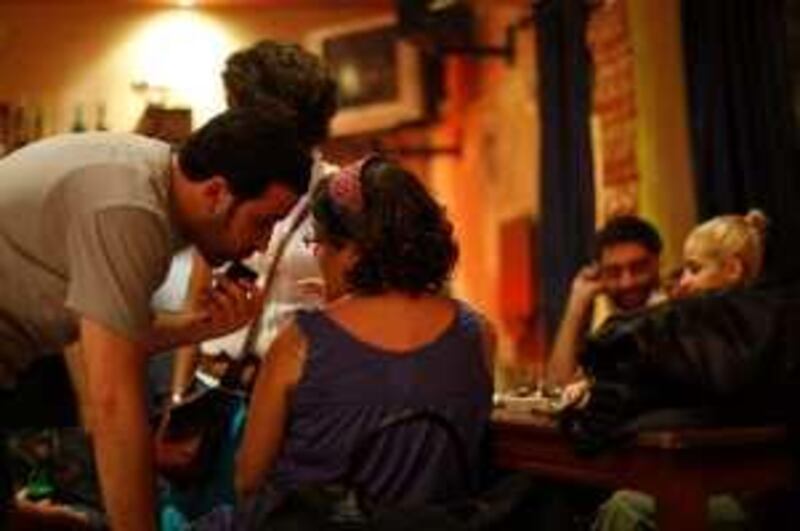AMMAN // When Abu Ismaeel recalled how his older sister, Alia Ahmed, was stabbed 28 times by another brother in a so-called "honour killing" after she had allegedly run away from her husband, he said that at first he thought she deserved it. Ahmed had left her and her husband's house at 1.30am one morning in mid-August, taking their 16-month-old boy with her. Ahmed's husband, Masoud, reported her missing to police and called her brothers to tell them she had run away.
When police found Ahmed, 37, a mother of eight, and handed her over to four of her brothers, they took her to her father-in-law's house in the crowded Palestinian refugee camp of Baqa'a. "Cousins and relatives were shouting 'You are not men, you are not men'," Abu Ismaeel said, in the presence of his brothers' lawyer, referring to the jeers of those who had expected them to kill her to restore the family's "honour". "Her husband then took the child from her and divorced her."
Abu Ismaeel said one of his brothers asked Ahmed to come into the house to talk with him alone. Moments later he ran out crying "I killed her, I killed her". "He was out of control," Abu Ismaeel said. "My other brother who really liked her entered the house and hugged her, and he got soaked in blood, so the police thought he took part in the stabbing." Police later discovered that Ahmed's husband had been beating her with a belt, and had in fact kicked her out of the house, only to later report her missing.
The two brothers are currently in prison while police continue to investigate the case. Bowing to pressure from rights activists, the government is trying to make it harder for men to get away with killing sisters and daughters in the name of "honour". Perpetrators have benefited from reductions in sentences if they had committed their crimes in a fit of fury. Sentences for honour killings have been as little three months to one year.
In May, the government presented a new draft law to parliament, asking that the minimum sentence be five years in prison. The proposal has not been discussed by the country's tribal-based, conservative parliament yet, and it remains unclear if parliament ever will approve the bill. Parliament has blocked similar efforts over fears that they would promote adultery. A special tribunal was set up in August to handle honour crimes.
"Having a specialised tribunal helps the application of the law, especially if the tribunal overseeing cases is aware of the law, both international and local, pertaining to such crimes," Yassin Abdullat, the attorney general, said. "But it is not enough. We need specialists in the whole process, starting with the investigation." At the moment, he said, most officials investigating honour crimes are not trained to do so. "People from parts of the Badia, for example, may think a woman who stays out late deserves to be killed."
There have been 18 reported honour killings in Jordan this year so far; there were 18 in total in 2008. Despite the recent efforts to curb honour killings, Human Rights Watch (HRW) pointed out that tribunals are not an adequate solution. Articles in the penal code need to be amended because they sanction the practice, HRW said. Societal attitudes need to be changed as well, experts in the field argue.
The King Hussein Foundation's information and research centre is working on a two-year project funded by the European Commission that seeks to change public perception of honour crimes by removing the "honour" label from the crime. Part of the project includes an interactive website called mathlouma.com. Mathlouma is the Arabic word for female victims of social injustice. "We want to replace it in the Jordanian psyche with a crime of 'socio-economics' and eliminate the false moral label," Nesreen Murad, the centre's director, said. "These crimes are a reflection of societal and economic ills that need to be specified and addressed - and an indication of the state of women in the Middle East in a patriarchal culture.
"Women are victims of social injustice, and men are also victims because they are required to be real men and protect the honour of their family." Ms Murad's assertions are backed by a study the centre conducted that showed a link between poverty and honour crimes. The study, based on 102 police cases in the past eight years, found that 73 per cent of the victims were economically disadvantaged females and 66 per cent of the perpetrators were poor males.
The study also found that 81 per cent of victims were under the age of 30 and 92 per cent had at most a high school education. Yusuf Mansur, an economist, presented the study at a conference on honour crimes this month. At the lawyer's office, Abu Ismaeel appeared remorseful over his sister's death. "Her husband was a bad man; he was on drugs. My sister married him when she was 15. So if there's anything bad about my sister's behaviour, it is because he brought her up that way," Abu Ismaeel said.
But he added: "Had she left the house willingly, she would have deserved what happened to her." @Email:smaayeh@thenational.ae





